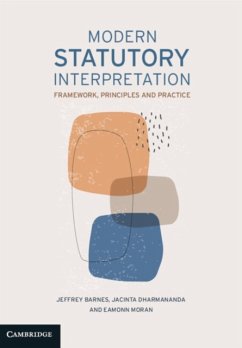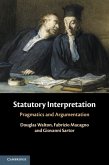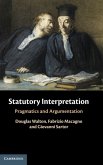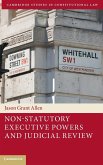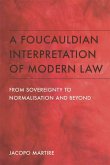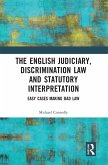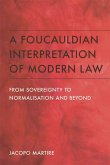Jeffrey Barnes (Victoria La Trobe University), Jacinta Dharmananda (Perth University of Western Australia), Eamonn Moran
Modern Statutory Interpretation
Versandkostenfrei innerhalb Deutschlands
123,99 €
inkl. MwSt.
Versandkostenfrei*
Liefertermin unbestimmt
Melden Sie sich
hier
hier
für den Produktalarm an, um über die Verfügbarkeit des Produkts informiert zu werden.
oder sofort lesen als eBook

62 °P sammeln
Jeffrey Barnes (Victoria La Trobe University), Jacinta Dharmananda (Perth University of Western Australia), Eamonn Moran
Modern Statutory Interpretation
- Broschiertes Buch
Modern Statutory Interpretation is an original, clear, coherent and research-based account of contemporary Australian statutory interpretation. It provides a comprehensive coverage of statutory interpretation law, legislative drafting, the parliamentary process, the modern history of interpretation, sources of doubt, and interpretation techniques.
Andere Kunden interessierten sich auch für
![Statutory Interpretation Statutory Interpretation]() Douglas Walton (Ontario University of Windsor)Statutory Interpretation37,99 €
Douglas Walton (Ontario University of Windsor)Statutory Interpretation37,99 €![Statutory Interpretation Statutory Interpretation]() Douglas Walton (Ontario University of Windsor)Statutory Interpretation124,99 €
Douglas Walton (Ontario University of Windsor)Statutory Interpretation124,99 €![Toward an Informal Account of Legal Interpretation Toward an Informal Account of Legal Interpretation]() Allan C. Hutchinson (Toronto York University)Toward an Informal Account of Legal Interpretation47,99 €
Allan C. Hutchinson (Toronto York University)Toward an Informal Account of Legal Interpretation47,99 €![Non-Statutory Executive Powers and Judicial Review Non-Statutory Executive Powers and Judicial Review]() Jason Grant Allen (Humboldt-Universitat zu Berlin)Non-Statutory Executive Powers and Judicial Review116,99 €
Jason Grant Allen (Humboldt-Universitat zu Berlin)Non-Statutory Executive Powers and Judicial Review116,99 €![A Foucauldian Interpretation of Modern Law A Foucauldian Interpretation of Modern Law]() Jacopo MartireA Foucauldian Interpretation of Modern Law32,99 €
Jacopo MartireA Foucauldian Interpretation of Modern Law32,99 €![The Judiciary, Discrimination Law and Statutory Interpretation The Judiciary, Discrimination Law and Statutory Interpretation]() Michael ConnollyThe Judiciary, Discrimination Law and Statutory Interpretation47,99 €
Michael ConnollyThe Judiciary, Discrimination Law and Statutory Interpretation47,99 €![A Foucauldian Interpretation of Modern Law A Foucauldian Interpretation of Modern Law]() Jacopo MartireA Foucauldian Interpretation of Modern Law152,99 €
Jacopo MartireA Foucauldian Interpretation of Modern Law152,99 €-
-
-
Modern Statutory Interpretation is an original, clear, coherent and research-based account of contemporary Australian statutory interpretation. It provides a comprehensive coverage of statutory interpretation law, legislative drafting, the parliamentary process, the modern history of interpretation, sources of doubt, and interpretation techniques.
Hinweis: Dieser Artikel kann nur an eine deutsche Lieferadresse ausgeliefert werden.
Hinweis: Dieser Artikel kann nur an eine deutsche Lieferadresse ausgeliefert werden.
Produktdetails
- Produktdetails
- Verlag: Cambridge University Press
- Seitenzahl: 816
- Erscheinungstermin: 29. Juni 2023
- Englisch
- Abmessung: 242mm x 170mm x 42mm
- Gewicht: 1388g
- ISBN-13: 9781108816021
- ISBN-10: 1108816029
- Artikelnr.: 64369847
- Herstellerkennzeichnung
- Libri GmbH
- Europaallee 1
- 36244 Bad Hersfeld
- gpsr@libri.de
- Verlag: Cambridge University Press
- Seitenzahl: 816
- Erscheinungstermin: 29. Juni 2023
- Englisch
- Abmessung: 242mm x 170mm x 42mm
- Gewicht: 1388g
- ISBN-13: 9781108816021
- ISBN-10: 1108816029
- Artikelnr.: 64369847
- Herstellerkennzeichnung
- Libri GmbH
- Europaallee 1
- 36244 Bad Hersfeld
- gpsr@libri.de
Dr Jeffrey Barnes is an Associate Professor in La Trobe Law School at La Trobe University. He assisted the Law Admissions Consultative Committee in preparing the Statement on Statutory Interpretation (Law Admissions Consultative Committee, 2010). Following that involvement, he was appointed the lead author of the Council of Australian Law Deans Good Practice Guide to Teaching Statutory Interpretation (Council of Australian Law Deans, 2015). He is the editor of The Coherence of Statutory Interpretation (The Federation Press, 2019). He has written a number of other texts on the topics of statutory interpretation, legislative drafting, the legislative process and administrative law. His doctorate was on the Plain Language Movement and legislation. In addition to producing scholarly writing, he has practised law widely, including as a parliamentary counsel for the NSW Parliamentary Counsel's Office, as Associate to the Chairman of and Law Reform Officer at the Australian Law Reform Commission, as Project Officer with the Administrative Review Council, and as a Legal Member (part-time) of the Social Security Appeals Tribunal. He has also been engaged by various government agencies as a consultant on statutory interpretation. His past academic appointments include Foundation Director of Teaching and Learning at La Trobe Law School, and Co-editor of Legal Education Review. In 2009 he developed and taught an elective subject on statutory interpretation, and since 2013 has developed and taught compulsory subjects wholly devoted to statutory interpretation for LLB and Juris Doctor students.
Part I. Background
1. The nature of statutory interpretation
2. A modern history of key concepts
3. Constitutional context
Part II. The Framework of Statutory Interpretation: 4. Legislative intent
5. The judicial duty to be independent
6. Text-based interpretation
7. Context
8. Purpose
9. Practical techniques
Part III. Working with Legislation: Broader Skills and Knowledge: 10. Legislative drafting
11. Enactment procedure
12. Commencement
13. Structure and components of an Act
14. Problem analysis: sources of doubt
Part IV. The Provision, and the Act as a Whole: 15. The language of the provision
16. The effect of drafting styles
17. Special categories of legislation: the interpretation of remedial, penal and revenue provisions
18. Linguistic canons
19. The 'always speaking' approach
20. The scheme and components of an Act
Part V. Legislative History: 21. Legislative antecedents (evolution) including subsequent amending Acts
22. Pre-existing common law
23. Background facts and circumstances
24. Extrinsic materials - pre-parliamentary and parliamentary materials
Part VI. Interpretation Acts and Other Acts of General Application: 25. Interpretation Acts
26. Other Acts of general application
Part VII. The Wider Context: 27. Consequences
28. The principle of legality
29. Use of the statute book and legislation of other jurisdictions
30. Use of precedent
31. International treaties and materials
32. Other common law presumptions and aids
33. Inadmissible considerations
Part VIII. Special Interpretative Issues: 34. Remedial constructions for drafting errors
35. Provisions in apparent conflict
36. Statutory powers and their characterisation: discretion or duty?
37. The effect of non-compliance with a statutory requirement
38. Statutory reasonableness
39. Presumption against retrospective operation
40. Presumption against application to government and other Crown entities
41. Presumption against extraterritorial operation
42. Mental ingredient of statutory offences
43. Delegated legislation
Appendix A. Glossary
Appendix B. Bibliography.
1. The nature of statutory interpretation
2. A modern history of key concepts
3. Constitutional context
Part II. The Framework of Statutory Interpretation: 4. Legislative intent
5. The judicial duty to be independent
6. Text-based interpretation
7. Context
8. Purpose
9. Practical techniques
Part III. Working with Legislation: Broader Skills and Knowledge: 10. Legislative drafting
11. Enactment procedure
12. Commencement
13. Structure and components of an Act
14. Problem analysis: sources of doubt
Part IV. The Provision, and the Act as a Whole: 15. The language of the provision
16. The effect of drafting styles
17. Special categories of legislation: the interpretation of remedial, penal and revenue provisions
18. Linguistic canons
19. The 'always speaking' approach
20. The scheme and components of an Act
Part V. Legislative History: 21. Legislative antecedents (evolution) including subsequent amending Acts
22. Pre-existing common law
23. Background facts and circumstances
24. Extrinsic materials - pre-parliamentary and parliamentary materials
Part VI. Interpretation Acts and Other Acts of General Application: 25. Interpretation Acts
26. Other Acts of general application
Part VII. The Wider Context: 27. Consequences
28. The principle of legality
29. Use of the statute book and legislation of other jurisdictions
30. Use of precedent
31. International treaties and materials
32. Other common law presumptions and aids
33. Inadmissible considerations
Part VIII. Special Interpretative Issues: 34. Remedial constructions for drafting errors
35. Provisions in apparent conflict
36. Statutory powers and their characterisation: discretion or duty?
37. The effect of non-compliance with a statutory requirement
38. Statutory reasonableness
39. Presumption against retrospective operation
40. Presumption against application to government and other Crown entities
41. Presumption against extraterritorial operation
42. Mental ingredient of statutory offences
43. Delegated legislation
Appendix A. Glossary
Appendix B. Bibliography.
Part I. Background
1. The nature of statutory interpretation
2. A modern history of key concepts
3. Constitutional context
Part II. The Framework of Statutory Interpretation: 4. Legislative intent
5. The judicial duty to be independent
6. Text-based interpretation
7. Context
8. Purpose
9. Practical techniques
Part III. Working with Legislation: Broader Skills and Knowledge: 10. Legislative drafting
11. Enactment procedure
12. Commencement
13. Structure and components of an Act
14. Problem analysis: sources of doubt
Part IV. The Provision, and the Act as a Whole: 15. The language of the provision
16. The effect of drafting styles
17. Special categories of legislation: the interpretation of remedial, penal and revenue provisions
18. Linguistic canons
19. The 'always speaking' approach
20. The scheme and components of an Act
Part V. Legislative History: 21. Legislative antecedents (evolution) including subsequent amending Acts
22. Pre-existing common law
23. Background facts and circumstances
24. Extrinsic materials - pre-parliamentary and parliamentary materials
Part VI. Interpretation Acts and Other Acts of General Application: 25. Interpretation Acts
26. Other Acts of general application
Part VII. The Wider Context: 27. Consequences
28. The principle of legality
29. Use of the statute book and legislation of other jurisdictions
30. Use of precedent
31. International treaties and materials
32. Other common law presumptions and aids
33. Inadmissible considerations
Part VIII. Special Interpretative Issues: 34. Remedial constructions for drafting errors
35. Provisions in apparent conflict
36. Statutory powers and their characterisation: discretion or duty?
37. The effect of non-compliance with a statutory requirement
38. Statutory reasonableness
39. Presumption against retrospective operation
40. Presumption against application to government and other Crown entities
41. Presumption against extraterritorial operation
42. Mental ingredient of statutory offences
43. Delegated legislation
Appendix A. Glossary
Appendix B. Bibliography.
1. The nature of statutory interpretation
2. A modern history of key concepts
3. Constitutional context
Part II. The Framework of Statutory Interpretation: 4. Legislative intent
5. The judicial duty to be independent
6. Text-based interpretation
7. Context
8. Purpose
9. Practical techniques
Part III. Working with Legislation: Broader Skills and Knowledge: 10. Legislative drafting
11. Enactment procedure
12. Commencement
13. Structure and components of an Act
14. Problem analysis: sources of doubt
Part IV. The Provision, and the Act as a Whole: 15. The language of the provision
16. The effect of drafting styles
17. Special categories of legislation: the interpretation of remedial, penal and revenue provisions
18. Linguistic canons
19. The 'always speaking' approach
20. The scheme and components of an Act
Part V. Legislative History: 21. Legislative antecedents (evolution) including subsequent amending Acts
22. Pre-existing common law
23. Background facts and circumstances
24. Extrinsic materials - pre-parliamentary and parliamentary materials
Part VI. Interpretation Acts and Other Acts of General Application: 25. Interpretation Acts
26. Other Acts of general application
Part VII. The Wider Context: 27. Consequences
28. The principle of legality
29. Use of the statute book and legislation of other jurisdictions
30. Use of precedent
31. International treaties and materials
32. Other common law presumptions and aids
33. Inadmissible considerations
Part VIII. Special Interpretative Issues: 34. Remedial constructions for drafting errors
35. Provisions in apparent conflict
36. Statutory powers and their characterisation: discretion or duty?
37. The effect of non-compliance with a statutory requirement
38. Statutory reasonableness
39. Presumption against retrospective operation
40. Presumption against application to government and other Crown entities
41. Presumption against extraterritorial operation
42. Mental ingredient of statutory offences
43. Delegated legislation
Appendix A. Glossary
Appendix B. Bibliography.
